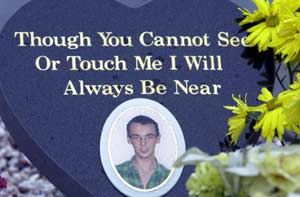27 July 2006 Edition
Damning indictment of Gardaí over Abbeylara
BY Matt Treacy

The Grave of John Carthy, who was shot dead by two members of the ERU outside his home
The report of the Barr Tribunal on the shooting dead of John Carthy by the Garda Emergency Response Unit at Abbeylara contains a strong indictment of the Gardaí for both their conduct of the so-called "siege", and their subsequent efforts to manipulate public perception of the case.
Indeed the latter has again been evident in the fallout from the publication of the report. While Justice Minister McDowell did issue an apology to the Carthy family on behalf of the state, such a gesture has not been forthcoming from the Gardaí. This moved McDowell to say that he believed that such an apology would eventually be issued when Commissioner Noel Conroy has arrived at a "considered view" on the report. He also defended the Assistant Commissioner Tony Hickey from Justice Barr's strong criticism of his handling of the case.
Although the report stops short of finding that the killing of John Carthy was unlawful, it indicts the Gardaí's handling of the incident, and in particular its reaction to Carthy's exiting of the house, as negligent. That negligence extended through the Garda chain of command from Hickey to the ERU officers at Abbeylara, and this contributed to Carthy's death.
There were glaring "intelligence" failures such as the fact that Superintendent Joseph Shelly did not pass on to the ERU information that Carthy had told his friend that he had no intention of shooting at Gardaí. The Garda who shot Carthy was not aware of this and claimed that he believed Carthy did pose a threat. Nor did the Gardaí seek advice from Carthy's GP in relation to his depression. Nor was Carthy's request to see a solicitor granted. Both of these failures on the part of Gardaí contributed significantly to Carthy's sense of isolation and confusion. In particular, a solicitor would have been able to reassure him with regard to his fears surrounding the family home and of being arrested.
Barr makes a number of recommendations in relation to Garda structure and tactics for similar incidents, including specialised training to deal with persons suffering from mental problems. His recommendation that the primary responsibility for the handling of future situations be given to the ERU must, however, be a cause of concern, given both Barr's own criticism of the unit, and the ERU's record in previous incidents.
From a human perspective, it is clear that the Gardaí had neither an understanding of John Carthy's personality, nor any real desire to arrive at such an understanding. The person described by his sister as a fun-loving, energetic and active sportsman - a man who, like many others, suffered from periodic depression - became transformed in Garda minds into a dangerous monster.
The gap between the official perception of John Carthy and that of his neighbours, who presumably would have been those who would have felt at risk had he been a dangerous individual, was illustrated by the reaction in Abbeylara to the report. Perhaps the Parish Priest Fr. Campbell summed it up best when he said that the Gardaí had shown "no real human consideration of the man".
The report is also critical of the media's role in the affair, an aspect strangely overlooked by most of the media. In particular Barr criticised RTE's Five Seven Live which had broadcast an interview containing personal details of Carthy's life which McCarthy was able to listen to inside his house. According to Barr, Niall O'Flynn was motivated by a "desire to steal a march on his news colleagues", and was in blatant disregard of Garda wishes. While Barr does not state so explicitly, it is clear that the broadcast may have contributed to Carthy's worsening state of mind.
The Sunday Independent also comes in for criticism. The report found that an article by Maeve Sheehan regarding an alleged dispute between Carthy and his sister over land was without foundation. In a further damning, but hardly surprising, indictment of Tony O'Reilly's yellow press, the report concludes that Sheehan's article "was probably orchestrated by an unidentified member or members of the Garda Siochana".
Sinn Féin Justice and Human Rights spokesperson Aengus Ó Snodaigh TD responded to the report:
"The long delay in receiving this report highlights the need a fully independent complaints procedure under a single Garda Ombudsman with powers at least equivalent to those of Nuala O'Loan's office covering the Six Counties. Here we have a case where a mentally ill man was killed unnecessarily and it has taken two years to establish a tribunal and a further four years to receive its report and recommendations.
"The overriding themes coming from this report are of negligence and failure on the part of the Gardaí but the ultimate responsibility must lie with the two Governments who have been in power since the killing of John Carthy. They have both failed to adequately deal with the fundamental problem that is the lack of accountability within the Gardaí and the need for root and branch Garda reform."



